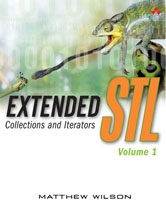|
|
|
Glossary of Terms
|
|
This page contains a glossary of terms used within the book.
Note: This page is under construction; last edited 19th July 2009
-
Arrangement-immutable Collection (Volume 1, Section 2.2.1, pg 17)
A collection that does not permit modification
to the arrangement of its elements.
-
Arrangement-mutable Collection (Volume 1, Section 2.2.1, pg 17)
A collection that permits modification to the
arrangement of its elements.
-
Associative Container (Volume 1, Section 1.2.2, pg 4)
A container that provides lookup of elements based on a key.
The four standard associative containers are
map,
multimap,
set,
and
multiset.
-
Class Adaptor (Volume 1, Prologue, pg xi)
A compile-time adaptor.
-
Collection (Volume 1, Section 2.2, pg 15)
A grouping of zero or more elements and an interface by which they may
be accessed in mutating and/or non-mutating fashion.
See also:
Contiguous Collection,
Arrangement-immutable Collection,
Arrangement-mutable Collection,
Element-immutable Collection,
Element-mutable Collection,
Immutable Collection.
STL Collection.
-
Container (Volume 1, Section 2.2, pg 16)
A collection that owns its objects and provides
operations by which those objects may be accessed and modified and,
optionally, added, removed and rearranged.
See also:
Associative Container,
Contiguous Container.
Sequence Container,
Standard Conformant Container,
Standard Container,
STL Container.
-
Contiguous Container (Volume 1, Section 2.2, pg 16)
An STL container that stores its elements in
a contiguous block of memory and exhibits
contiguous iterators.
-
Contiguous Collection (Volume 1, Section 2.2, pg 17)
An STL collection whose elements are stored
in a contiguous block of memory and that exhibits
contiguous iterators.
-
Contiguous Iterator (Volume 1, Section 2.3.6, pg 19)
A Random-access iterator for which the
relation &*(it + 1) == &*it + 1 holds.
-
Creator Function (Volume 1, Section 5.1.3, pg 35)
A function template that is used to create an instance of a specialisation
of a class template, without requiring that the user specify all the
template parameters. Creator functions rely on C++'s ability to implicitly
instantiate function templates.
-
Dereference Proxy Pattern (Volume 1, Section 35, pg 478)
A nested class that is returned from the dereference operator and has an
appropriately defined assignment operator.
See:
"Dereference Proxy Pattern", STLSoft Libraries
-
Duck Rule, The (Volume 1, Section 10.1.3, pg 60)
If it looks like a duck, walks like a duck, and quacks like a duck, it is
a duck.
See also:
The Goose Rule
-
Element-immutable Collection (Volume 1, Section 2.2.1, pg 17)
A collection that does not permit modification
to its elements.
-
Element-mutable Collection (Volume 1, Section 2.2.1, pg 17)
A collection that permits modification to
its elements.
-
Element Reference, By-Value Temporary (Volume 1, 3.3.5, pg 28)
Not a reference at all, but is in fact a temporary instance returned
from the callee.
Rule: Iterators having element reference category
of By-Value Temporary cannot define the member selection
operator.
See also:
Element Reference Category
-
Element Reference, Fixed (Volume 1, 3.3.2, pg 24)
References an element of an
arrangement immutable collection.
See also:
Element Reference Category
-
Element Reference, Invalidatable (Volume 1, 3.3.3, pg 24)
References an element of an
arrangement mutable collection.
See also:
Element Reference Category
-
Element Reference, Permanent (Volume 1, 3.3.1, pg 23)
Can be invalidated by non-mutating use of their host objects.
See also:
Element Reference Category
-
Element Reference, Transient (Volume 1, 3.3.4, pg 26)
References an element of a nonlocal
arrangement immutable collection.
See also:
Element Reference Category
-
Element Reference, Void (Volume 1, 3.3.6, pg 29)
No value can be obtained from an iterator instance.
Rule: Iterators having element reference category
of Void cannot define the member selection operator.
See also:
Element Reference Category
-
Endpoint Iterator (Volume 1, Prologue, pg xi)
An iterator value that represents the end-point of an iterator range. An
endpoint iterator is never dereferenceable The values returned by
end() and rend() are endpoint iterators.
-
Goose Rule, The (Volume 1, Section 10.1.3, pg 61)
It may look like a duck, it may walk like a duck, and sometimes it may
quack like a duck, but a duck it is not. Assuming it's a duck make make
you a goose!
See also:
The Duck Rule
-
Henney's Hypothesis (Volume 1, 2.2.1, pg 17)
For each additional [required] template parameter, the potential number
of users is halved.
-
Immutable Collection (Volume 1, 2.2.1, pg 17)
A collection that does not permit modification
to its elements or the arrangement of its elements.
-
Instance Adaptor (Volume 1, Prologue, pg xi)
A run-time adaptor.
-
Permanent Element Reference (Volume 1, 3.3.1, pg 23)
See Element Reference, Permanent.
-
Sequence Container (Volume 1, Section 1.2.1, pg 4)
A container that maintains a strict linear arrangement of elements.
The four standard associative containers are
deque,
list,
vector,
and
basic_string.
-
Standard-conformant Container (Volume 1, Section 2.2, pg 16)
An STL container that meets the requirements
of the standard library's container concept.
-
Standard Container (Volume 1, Section 2.2, pg 16)
A standard-conformant container
currently defined by the standard library.
-
STL Collection (Volume 1, Section 2.2, pg 16)
A collection that provides mutating and/or
non-mutating iterator ranges via begin() and end()
methods.
-
STL Container (Volume 1, Section 2.2, pg 16)
A container that provides mutating and/or
non-mutating iterator ranges via begin() and end()
methods.
-
Type Generator Template (Volume 1, Section 12.1, pg 75)
A class template whose purpose is to define one or member types based on
characteristics of its specialising type(s). Type generators can be used
to make up for the lack of template typedefs in C++.
-
True Typedef (Volume 1, Section 12.1, pg 75)
A special-purpose type generator
that provides a way to disambiguate otherwise interconvertible types,
while preserving mathematical and logical operator syntax.
See: "True Typedefs", Matthew Wilson, C/C++ Users' Journal, March 2003
|
|


